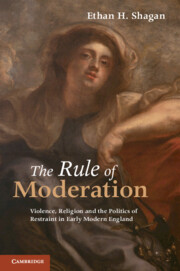Introduction
from Part I - Moderate foundations
Published online by Cambridge University Press: 05 June 2012
Summary
This book began as an attempt to answer a deceptively simple question: why was it that whenever the Tudor-Stuart regime most loudly trumpeted its moderation, that regime was at its most vicious? The question had first occurred to me in the context of Henry VIII's remarkable, simultaneous execution of three Catholics and three Protestants in July 1540 as a (literally) flamboyant statement of the Church of England's moderation. But over years of teaching English history, I found that the question seemed to recur in a wide variety of contexts: the claim to punish religious dissidents for their conduct but not to make windows into men's souls; the use of writs of the peace to enforce order and punish offenders without resorting to the courts; claims for the moderation of the English empire compared to the excesses of New Spain; laws promoting religious toleration that established new penalties for blasphemy. The common thread running through these examples was that they were all cases where power was authorised and even amplified by its limitation. My deceptively simple question, I realised, led deep into the ideological heart of early modern England.
My first answer to this question was that moderation was an intrinsically relational and comparative ethical framework, so that every claim to the moderate centre involved the construction and vilification of extremists on the margins. I still stand by this initial answer, and while I am hardly the first scholar to notice it, the intrinsically aggressive character of moderation is far too rarely emphasised. As a historian, however, I soon became unsatisfied with such an ahistorical, structural thesis. If moderation were ‘always already’ aggressive, then there seemed little point in isolating one specific example of it or studying its ideological resonances in a particular time and place. I was uninterested in practising philosophy without a licence; I wanted to understand what made moderation so peculiarly important to early modern England.
Information
- Type
- Chapter
- Information
- The Rule of ModerationViolence, Religion and the Politics of Restraint in Early Modern England, pp. 7 - 29Publisher: Cambridge University PressPrint publication year: 2011
